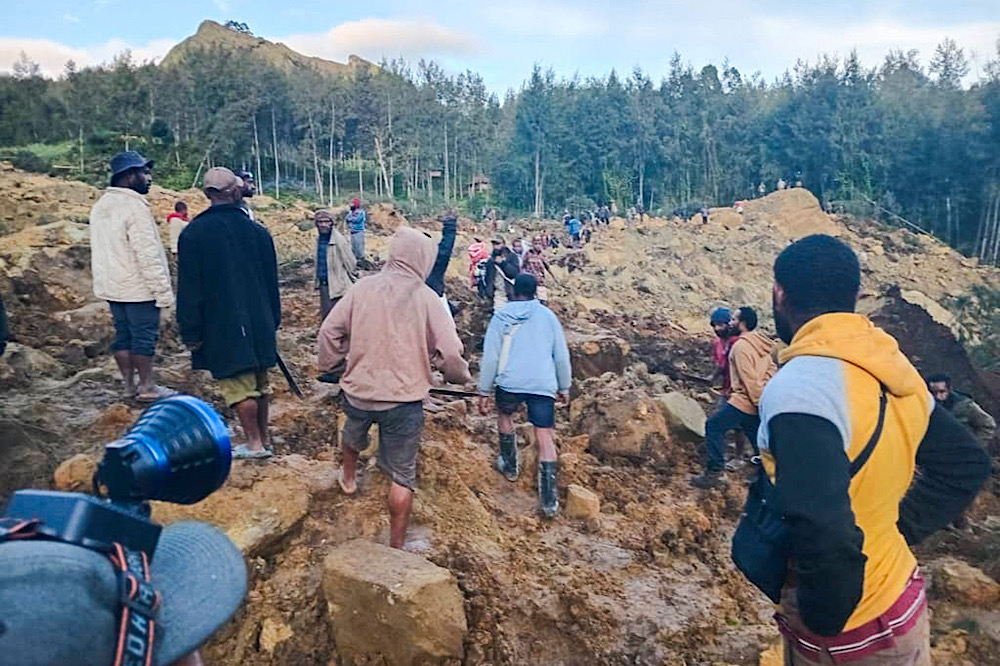Landslide kills scores in Kaokalam village
According to some local sources, over a hundred have died, but the authorities have not yet released any official figure. The incident took place in a remote area, which hinders rescue operations. The causes are unknown, but experts rule out heavy rain or earthquakes. Gold mining in the area is one possible factor
Port Moresby (AsiaNews) – Dozens of people, perhaps over a hundred according to some unconfirmed estimates, were killed this morning in a landslide that buried a village in a remote mountainous area of Papua New Guinea.
The area’s remoteness has hampered rescue operations, and prevented an accurate death toll.
The landslide covered much of Kaokalam, a village in Enga province, about 600 km northwest of the capital Port Moresby around 3 am local time, the Australian Broadcasting Corporation (ABC) reports.
Given the uncertainty of the situation, the authorities have not yet confirmed the number of dead. Local sources cited in the media claim that more than a hundred people lost their life, but villagers think that the toll could be much higher.
Prime Minister James Marape said the authorities were responding to the emergency and would release detailed information, including the number of dead, as soon as the data become available.
“I am yet to be fully briefed on the situation. However, I extend my heartfelt condolences to the families of those who lost their lives in the landslide disaster in the early hours of this morning,” Marape said in a statement.
“We are sending in disaster officials, PNG Defence Force, and the Department of Works and Highways to ... start relief work, recovery of bodies, and reconstruction of infrastructure,” he added.
Videos on social media show residents pulling out bodies buried under rocks and trees.
Elizabeth Laruma, who runs a women's business association in Porgera, a town in the same province near the Porgera gold mine, said houses were razed to the ground when the side of a mountain gave way.
The incident “occurred when people were still asleep in the early hours, and the entire village has gone down,” Laruma said. “From what I can presume, it’s about 100-plus people who are buried beneath the ground.”
The landslide also blocked the road between Porgera and the village, raising concerns about the town’s supply of fuel and goods.
Belinda Kora, ABC’s correspondent from Port Moresby, said that, since the main road is closed, helicopters were the only way in and out of the village, which is located in the Highlands, a mountainous region in the interior of the country.
In addition to nature, different factors are being looked at as possible causes of this natural disaster.
“On first inspection, this is a large rock slope failure that has transitioned into a rock and debris avalanche. There has been no indications that there was a trigger event, such as intense rainfall or an earthquake,” writes geologist Dave Petley, a world leader in the study and management of landslides.
“It will be interesting to see whether the slope had been subjected to mining or quarrying,” he added, suggesting that human action could possibly explain the incident.
“Note the very steep, planar surface at the rear of the landslide scar, and also on the left side. This suggests to me that the landslide has mobilised existing planes of weakness in the rock mass,” he explained.
Papua New Guinea is a diverse, developing nation with 800 different languages and few roads outside the larger cities. Its population is largely dependent on subsistence farming.
With 10 million people, it is also the most populous country in the South Pacific after Australia, which is home to about 27 million.
19/02/2024 13:45
17/08/2022 11:23
06/10/2021 15:35







.png)










